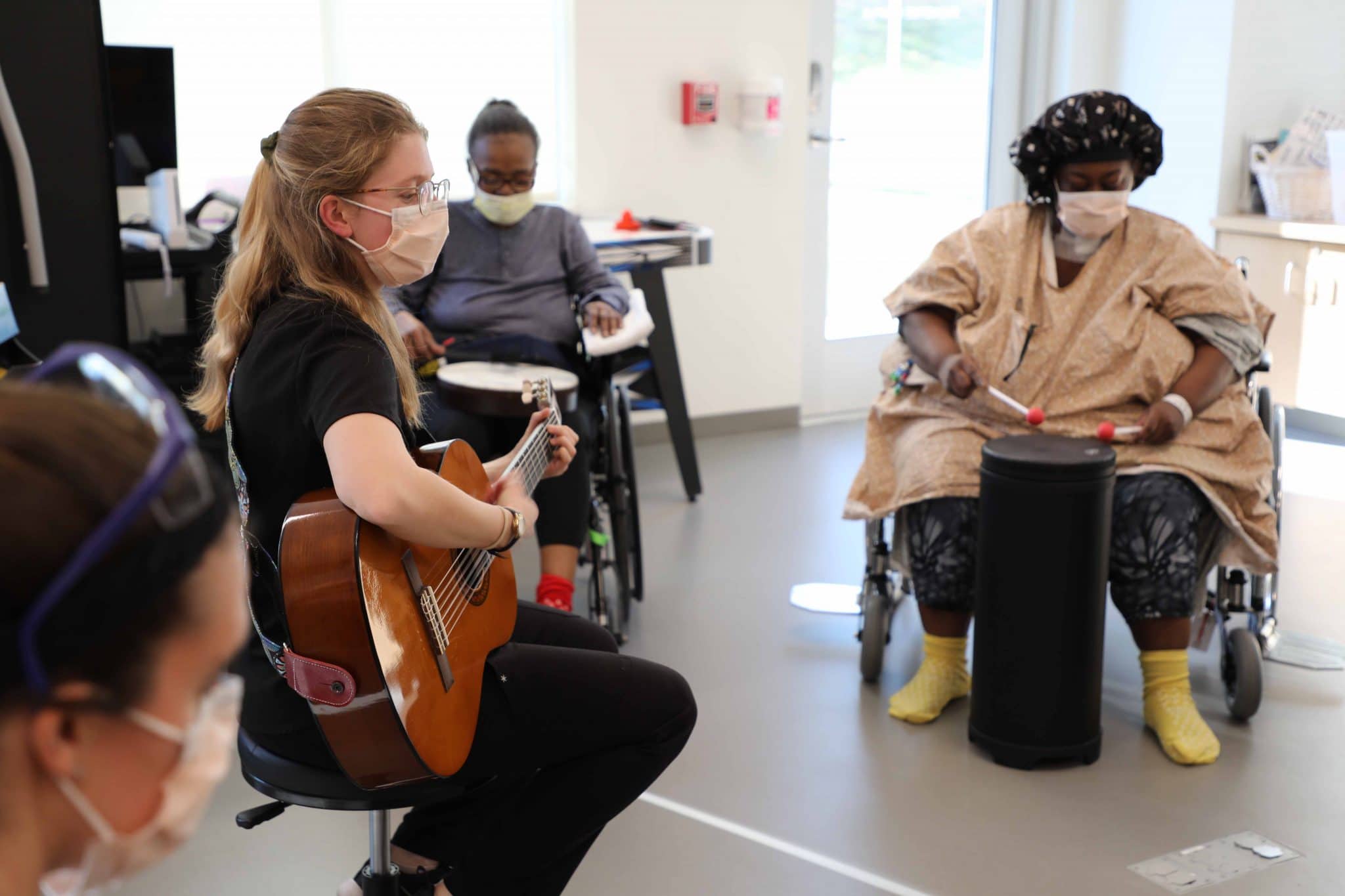Home>Events & Info>Music Therapy>How Music Therapy Work In Mental Health


Music Therapy
How Music Therapy Work In Mental Health
Published: February 1, 2024
Discover how music therapy can benefit mental health and improve well-being. Learn how this powerful form of therapy uses music to support relaxation, reduce stress, and promote emotional healing.
(Many of the links in this article redirect to a specific reviewed product. Your purchase of these products through affiliate links helps to generate commission for AudioLover.com, at no extra cost. Learn more)
Table of Contents
- Introduction
- Definition of Music Therapy
- History of Music Therapy
- Principles of Music Therapy
- Benefits of Music Therapy in Mental Health
- Case Studies of Music Therapy in Mental Health
- Techniques Used in Music Therapy for Mental Health
- How Music Therapy Affects the Brain
- Challenges and Limitations of Music Therapy in Mental Health
- Conclusion
Introduction
Music has always been a powerful tool that resonates with us on a deep emotional level. It has the ability to evoke memories, trigger feelings, and transport us to another place and time. In recent years, there has been a growing recognition of the therapeutic benefits of music, leading to the development of a specialized field known as music therapy.
Music therapy is a form of expressive therapy that uses music and musical elements to address physical, emotional, cognitive, and social needs of individuals. It is based on the belief that music has the power to heal and promote overall well-being. Music therapists are trained professionals who use their knowledge of music and its effects to facilitate positive changes in their clients.
Music therapy has a long history, dating back to ancient civilizations where music was used for healing rituals. In the modern era, music therapy gained recognition as a formal discipline during and after World War II, when it was used to help wounded soldiers recover from physical and emotional trauma. Since then, music therapy has evolved and expanded, finding its place in various healthcare settings, including mental health.
The use of music therapy in mental health is based on the understanding that music can positively influence our thoughts, emotions, and behaviors. It provides a creative and non-verbal medium for individuals to express and process their feelings, which can be particularly helpful for those who struggle with verbal communication. Music therapy is a holistic approach that addresses the individual’s mind, body, and spirit, supporting their mental and emotional well-being.
The benefits of music therapy in mental health are diverse and impactful. It can help reduce anxiety and stress, improve mood and emotional regulation, enhance social interactions, boost self-esteem and self-expression, and aid in the development of coping mechanisms. Music therapy is used in a variety of mental health settings, including hospitals, psychiatric facilities, schools, and rehabilitation centers, catering to individuals of all ages, from children to older adults.
This article will delve deeper into the principles, techniques, and effects of music therapy in mental health. Through case studies and examples, we will explore how music therapy can be a powerful tool for promoting mental well-being and improving the quality of life for individuals facing mental health challenges.
Definition of Music Therapy
Music therapy is a specialized form of therapy that uses music and musical activities to address the physical, emotional, cognitive, and social needs of individuals. It is a well-established healthcare profession that recognizes the healing power of music and its ability to facilitate therapeutic changes.
The American Music Therapy Association (AMTA) defines music therapy as “the clinical and evidence-based use of music interventions to accomplish individualized goals within a therapeutic relationship by a credentialed professional who has completed an approved music therapy program.”
In a music therapy session, a trained music therapist uses various musical techniques and approaches tailored to the specific needs and goals of the client. These may include playing musical instruments, singing, songwriting, improvisation, listening to pre-recorded music, and movement to music. The therapist works closely with the client to create a safe and supportive environment that allows for exploration, expression, and reflection.
Music therapy can benefit individuals of all ages and can be used as a standalone therapy or in conjunction with other therapeutic approaches. It is particularly effective for individuals with mental health issues such as anxiety, depression, PTSD, schizophrenia, and autism spectrum disorders.
One of the key principles of music therapy is the idea that music connects with individuals on multiple levels simultaneously. It stimulates the senses, evokes emotions, activates memories, and engages the mind. This multi-dimensional experience helps to foster self-awareness, promote emotional expression, and enhance communication.
It is important to note that music therapy is distinct from music education or entertainment. While music can be enjoyed for its aesthetic value or learned for skill development, music therapy goes beyond these purposes. It is a therapeutic process guided by a trained professional with the specific intention of addressing clinical goals and improving the overall well-being of the individual.
Overall, music therapy is a powerful and effective form of therapy that harnesses the unique qualities of music to support individuals in achieving their therapeutic goals, promoting self-expression, and enhancing their overall quality of life.
History of Music Therapy
The use of music for therapeutic purposes can be traced back to ancient civilizations, where music was considered a healing tool. From the biblical stories of David playing the harp to soothe King Saul’s troubled mind, to the ancient Greeks using music as a form of therapy in their healing temples, the therapeutic effects of music have been recognized throughout history.
However, the formal discipline of music therapy as we know it today emerged in the 20th century. It gained recognition and validation during and after World War II, when musicians visited hospitals to play for soldiers suffering from physical and emotional trauma. These interactions demonstrated that music not only provided comfort and relief but also had measurable physiological and psychological effects.
In the 1940s and 1950s, pioneers in the field of music therapy, such as E. Thayer Gaston and Willem van de Wall, began shaping the profession and developing therapeutic interventions. They focused on using music to engage patients in active music-making to address physical, emotional, and mental health needs.
By the 1960s, music therapy had expanded beyond hospitals and was being employed in various clinical settings, including psychiatric hospitals and rehabilitation centers. The field continued to evolve, and in 1998, music therapy gained recognition as a healthcare profession with the establishment of the National Music Therapy Registry by the American Music Therapy Association (AMTA).
Since its formal establishment, music therapy has undergone significant advancements in research, training, and therapeutic techniques. The profession has developed rigorous educational standards, clinical training requirements, and a code of ethics to ensure the highest quality of care.
Today, music therapy is practiced worldwide and is integrated into diverse healthcare settings, including hospitals, mental health centers, schools, nursing homes, and private practices. It is recognized as an evidence-based practice that complements traditional therapeutic approaches, and its effectiveness is supported by a growing body of research.
The history of music therapy highlights the enduring power of music as a therapeutic tool. What started as a natural response to the healing qualities of music has evolved into a respected profession that continues to improve the quality of life for individuals facing physical, emotional, and mental health challenges.
Principles of Music Therapy
Music therapy is guided by a set of principles that inform the therapeutic process and ensure the highest quality of care. These principles are rooted in the understanding of music’s inherent qualities and its impact on human emotions, cognition, and physical well-being. They serve as a framework for music therapists to develop individualized treatment plans and interventions for their clients.
1. Non-verbal Communication: Music therapy recognizes that music has a unique ability to convey emotions and messages that may be difficult to express through words alone. It provides an alternative means of communication and allows individuals to express and process their thoughts, feelings, and experiences non-verbally.
2. Active Engagement: Music therapy emphasizes active participation and engagement in the music-making process. The client is encouraged to actively create or respond to music, rather than passively listen. This active engagement promotes a sense of empowerment, self-expression, and ownership of the therapeutic experience.
3. Individualized Approach: Each individual has unique needs and goals, and music therapy is tailored to meet those specific needs. Music therapists assess the client’s strengths, preferences, and challenges to develop personalized treatment plans that address their specific physical, emotional, cognitive, and social needs.
4. Therapeutic Relationship: The therapeutic relationship between the music therapist and the client is crucial in music therapy. Trust, respect, and empathy are essential to establishing a safe and supportive environment where the client feels comfortable exploring their emotions and experiences through music.
5. Creative Expression: Music therapy encourages creative expression through musical improvisation, composition, and songwriting. These creative activities provide individuals with a means to express their emotions, explore new possibilities, and develop a sense of self-identity.
6. Multimodal Stimulation: Music therapy engages multiple senses simultaneously. It combines auditory, tactile, and kinesthetic experiences to stimulate various areas of the brain and facilitate holistic responses. This multimodal stimulation enhances cognitive function, sensory integration, and emotional regulation.
7. Integration of Treatment Goals: Music therapy integrates the client’s treatment goals into the musical experiences and interventions. The therapist collaborates with other healthcare professionals to ensure that the therapy aligns with the client’s overall treatment plan, addressing specific therapeutic objectives and promoting progress towards desired outcomes.
By following these principles, music therapists create a therapeutic environment that supports the client’s growth, self-discovery, and overall well-being. The principles guide the selection of appropriate interventions, strategies, and musical experiences that enhance the effectiveness of music therapy in addressing an individual’s unique needs and goals.
Benefits of Music Therapy in Mental Health
Music therapy has been shown to have a wide range of benefits for individuals experiencing mental health challenges. It provides a unique and creative outlet for expression and communication, offering therapeutic support in various ways. Here are some of the key benefits of music therapy in mental health:
1. Emotional Regulation: Music has the power to evoke and express emotions. Through music therapy, individuals can explore and express their feelings in a safe and non-threatening way. It can help regulate emotions, reduce anxiety and stress, and improve mood.
2. Enhancing Self-expression: Music therapy encourages self-expression and self-identity development. It enables individuals to express their thoughts, experiences, and emotions through music when verbal communication may be challenging. This creative outlet can improve self-esteem and empower individuals to find their voice.
3. Improving Communication Skills: Music therapy promotes effective communication skills. For individuals with mental health conditions such as autism or schizophrenia, music provides a structured and predictable medium to engage in social interactions, improve turn-taking skills, and enhance non-verbal communication.
4. Stress Reduction and Relaxation: Music has a calming and soothing effect on the nervous system. Music therapy can help individuals manage stress, reduce anxiety levels, and induce a state of relaxation. It can also support improved sleep patterns and alleviate symptoms of insomnia.
5. Cognitive Stimulation: Engaging in musical activities stimulates various cognitive functions, including attention, memory, and problem-solving skills. Music therapy can enhance cognitive abilities and promote mental clarity and focus in individuals with mental health disorders.
6. Social Interaction: Participating in music therapy sessions provides opportunities for social interaction and connection. Group music therapy sessions foster a sense of belonging, encourage relationships, and promote social skills development, improving interpersonal relationships and reducing feelings of isolation or loneliness.
7. Coping and Resilience: Music therapy provides individuals with coping mechanisms and promotes resilience. It helps individuals explore and process their emotions, develop healthy coping strategies, and build resilience in the face of mental health challenges.
8. Motivation and Engagement: Music therapy can increase motivation and engagement in therapeutic activities. The enjoyable nature of music can motivate individuals to actively participate in their treatment process and increase their overall motivation for recovery.
9. Mood Enhancement: Music has a profound impact on mood. Music therapy can positively influence mood, uplift spirits, and provide a sense of joy and pleasure. It can serve as a source of inspiration, helping individuals find comfort and hope.
These are just some of the many benefits that music therapy offers in the realm of mental health. The power of music to heal, inspire, and support individuals in their journey towards mental and emotional well-being is truly remarkable.
Case Studies of Music Therapy in Mental Health
Music therapy has been applied successfully in various mental health settings, helping individuals improve their well-being and overcome personal challenges. Here are a few case studies that highlight the effectiveness of music therapy in mental health:
Case Study 1: Anxiety and Panic Disorder
Emma, a 32-year-old woman, struggled with severe anxiety and panic disorder. Traditional talk therapy had limited success in managing her symptoms. Music therapy was incorporated into her treatment plan to provide an alternative way for Emma to express and process her anxiety. Through improvisation and songwriting, Emma found a means to channel her anxious energy into creative expression. She learned relaxation techniques using guided imagery and music. Over time, Emma reported a reduction in the frequency and intensity of her panic attacks and gained coping strategies to manage her anxiety in everyday life.
Case Study 2: Depression and Low Self-esteem
Michael, a 16-year-old boy, experienced chronic depression and struggled with low self-esteem. He had difficulty expressing his emotions verbally and felt disconnected from others. Music therapy sessions provided a safe space for Michael to explore his emotions through songwriting and singing. As he shared his musical creations, he began to open up about his struggles and gain insight into his own worth and value. Music therapy also incorporated group sessions where Michael interacted with peers, fostering a sense of belonging. Over time, Michael’s depressive symptoms decreased, and he developed a more positive self-image.
Case Study 3: Autism Spectrum Disorder
Liam, a 10-year-old boy with autism spectrum disorder, faced challenges with social interaction and communication. Traditional therapeutic approaches had limited success in engaging him. Music therapy utilized rhythms, melodies, and structured interactive activities to stimulate Liam’s engagement. Playing instruments, singing, and engaging in rhythmic activities helped Liam develop social skills, such as turn-taking and joint attention. Music therapy also supported emotional regulation, with specific songs used to help Liam express and understand his emotions. Over time, Liam’s communication and social skills improved, and he became more comfortable and confident in social interactions.
These case studies illustrate the positive impact of music therapy on individuals with mental health challenges. They demonstrate how music can be a powerful tool for self-expression, emotional regulation, social connection, and personal growth. Each case highlights the individualized approach and the importance of the therapeutic relationship between the client and the music therapist.
Music therapy provides a unique and effective means of addressing mental health issues, allowing individuals to tap into their own strengths and resilience through the power of music.
Techniques Used in Music Therapy for Mental Health
Music therapists utilize a variety of techniques tailored to the specific needs of individuals in mental health settings. These techniques harness the power of music to address physical, emotional, cognitive, and social needs. Here are some commonly used techniques in music therapy for mental health:
1. Music Listening: Listening to carefully selected music can evoke specific emotions, calm the mind, or energize the body. Music therapists may create personalized playlists or use pre-recorded music to facilitate relaxation, emotional expression, or mood enhancement.
2. Songwriting and Lyric Analysis: Creating original songs or analyzing existing lyrics can help individuals express their thoughts, emotions, and personal experiences in a structured and creative way. This technique provides a platform for self-reflection and storytelling.
3. Instrument Playing: Learning to play instruments allows individuals to express themselves through music-making. Whether it’s percussion, guitar, piano, or other instruments, the focus on physical engagement with the instrument can promote relaxation, improve fine motor skills, and foster self-expression.
4. Improvisation: Improvisation encourages spontaneous musical expression without pre-planned structures. It allows individuals to explore their emotions, creativity, and self-expression in a non-judgmental environment. Improvisation promotes self-discovery and can facilitate emotional release.
5. Music and Movement: Combining music with movement can be a powerful therapeutic tool. Dancing, drumming, or using props such as scarves or ribbons while moving to music can promote self-expression, relaxation, coordination, body awareness, and social interaction.
6. Guided Imagery and Music: This technique involves guided relaxation and visualization exercises paired with carefully chosen music. It can help individuals explore their inner landscapes, access emotions, and process experiences in a safe and supportive environment.
7. Therapeutic Singing: Utilizing voice and singing can be a transformative experience in music therapy. Singing can promote emotional release, regulate breathing, and strengthen the vocal and respiratory muscles. Group singing can foster social connection and a sense of belonging.
8. Music-assisted Relaxation: Using calming melodies and soundscapes, music therapists facilitate relaxation exercises to help individuals reduce stress, anxiety, and promote a sense of calm and well-being. These relaxation techniques can include deep breathing, progressive muscle relaxation, and guided imagery.
These techniques, among many others, allow individuals to engage with music in therapeutic ways, promoting self-expression, emotional regulation, and personal growth. It is important to note that each technique is carefully selected and tailored to meet the specific needs and goals of the individual receiving music therapy.
By harnessing the power of music and combining it with therapeutic techniques, music therapy offers a unique approach to address mental health challenges and support individuals on their journey to improved well-being.
How Music Therapy Affects the Brain
Music has a profound effect on the brain, and music therapy harnesses this impact to facilitate therapeutic changes in individuals. Understanding how music therapy affects the brain is essential in comprehending its therapeutic benefits. Here are some ways in which music therapy influences the brain:
1. Emotional Processing: Music can evoke and elicit emotions in a way that is distinct from other forms of stimuli. When engaging in music therapy, the brain’s emotional centers, such as the amygdala and the limbic system, are activated. This activation can help individuals identify, process, and express their emotions in a safe and supportive environment.
2. Neuroplasticity: Music therapy has shown to promote neuroplasticity, which refers to the brain’s ability to reorganize and create new connections. Active engagement in musical activities stimulates various brain areas, increasing synaptic connections and promoting neural flexibility. This can be particularly beneficial for individuals with neurological conditions or those recovering from brain injuries.
3. Dopamine Release: Listening to or engaging in music can trigger the release of dopamine, a neurotransmitter associated with pleasure and reward. This release of dopamine in the brain can enhance motivation, improve mood, and create a sense of pleasure and enjoyment in individuals undergoing music therapy.
4. Language and Communication: Music therapy can activate brain areas associated with language and communication. The rhythmic and melodic elements of music can enhance speech production, improve language fluency, and facilitate verbal communication, particularly in individuals with language impairments or developmental disorders.
5. Memory and Recall: Music has a unique ability to evoke memories and stimulate recall in individuals. The neural pathways involved in music processing are closely connected to memory centers in the brain. Music therapy can be used to trigger memories, improve cognitive function, and enhance memory recall in individuals with cognitive impairments or memory disorders such as dementia.
6. Stress Reduction: Engaging in music therapy activates the parasympathetic nervous system, reducing stress and promoting relaxation. Slow and calming music can help regulate heart rate, blood pressure, and cortisol levels, promoting a sense of calm and well-being in individuals experiencing high levels of stress or anxiety.
7. Neural Synchronization: When individuals engage in music-making together, their brain activity synchronizes. This neural synchrony fosters social connection, empathy, and a sense of belonging. It strengthens neural connections related to social interaction and empathy, promoting interpersonal relationships and social skills development.
Overall, music therapy has a profound impact on the brain, influencing emotional processing, neuroplasticity, neurotransmitter release, language, memory, stress levels, and social connections. By utilizing music and its effects on the brain, music therapists can facilitate positive changes in individuals and support their overall well-being.
Challenges and Limitations of Music Therapy in Mental Health
While music therapy holds numerous benefits and is widely recognized as a valuable therapeutic approach in mental health, it also faces certain challenges and limitations. It is important to be aware of these factors to ensure responsible and effective implementation of music therapy. Here are some of the challenges and limitations:
1. Individual Response Variation: Each individual responds to music therapy in a unique way, due to personal preferences, cultural background, and past experiences. Therefore, it can be challenging to find the right approach and musical interventions that resonate with every client. Music therapists need to continuously adapt and modify their techniques to meet the specific needs of their clients.
2. Limited Research Evidence: While there is growing research on the effectiveness of music therapy, more high-quality studies are needed to fully establish its evidence base. The field would benefit from further research exploring specific techniques, populations, and treatment outcomes to provide a more comprehensive understanding of how music therapy can best be utilized in mental health settings.
3. Access and Availability: One of the challenges in music therapy is ensuring equitable access and availability of services. Music therapy may not be readily available in all locations, and there may be limited resources or funding for implementing music therapy programs in certain settings. This can limit the reach of music therapy and prevent individuals from benefiting from its potential.
4. Need for Collaboration: Music therapy should not be considered a standalone treatment, but rather an adjunctive therapy that complements other therapeutic approaches. Collaboration and communication with other healthcare professionals are essential to integrate music therapy effectively into an individual’s overall treatment plan. This requires interdisciplinary teamwork and coordination.
5. Ethical Considerations: Music therapists must adhere to ethical guidelines and maintain professional boundaries in their practice. Confidentiality, informed consent, and conducting therapy in a safe and ethical manner are crucial aspects of music therapy to ensure the well-being and autonomy of the clients. Ethical challenges may arise in complex situations or when faced with ethical dilemmas.
6. Cultural Sensitivity: Music therapy should be culturally sensitive and inclusive. It is essential to recognize that different cultures have distinct musical traditions and preferences, and that these must be respected and integrated into the therapeutic process. Ensuring cultural sensitivity enhances the effectiveness and relevance of music therapy interventions.
7. Reimbursement and Recognition: Despite its proven benefits, music therapy may face challenges in terms of recognition and reimbursement. In some healthcare systems or insurance models, there may be limited coverage or reimbursement for music therapy services. This can create barriers to access and limit the integration of music therapy into mainstream mental healthcare.
While these challenges and limitations exist, they do not diminish the value of music therapy in mental health. Awareness of these factors allows for continuous improvement and refinement of music therapy practice, ensuring its responsible and effective implementation for the benefit of individuals seeking mental health support.
Conclusion
Music therapy is a powerful and dynamic therapeutic approach that utilizes music to address the physical, emotional, cognitive, and social needs of individuals in mental health settings. It offers a unique and creative outlet for self-expression, emotional processing, and personal growth. The benefits of music therapy range from emotional regulation and improved communication skills to stress reduction and enhanced cognitive function.
Throughout history, music has been recognized as a healing tool, and the formal discipline of music therapy emerged in the 20th century. Music therapy has a rich history of evolving research, training standards, and the establishment of professional credentialing bodies. Its effectiveness is supported by a growing body of evidence and numerous case studies showcasing its positive impact on individuals’ mental well-being.
Despite the challenges and limitations faced by music therapy, including individual response variation and limited research evidence, it remains a valuable and impactful therapeutic approach. Collaboration with other healthcare professionals, cultural sensitivity, and ethical considerations are vital in ensuring the responsible and effective implementation of music therapy in mental health settings.
Music therapy offers individuals a safe, creative, and non-intrusive way to navigate their mental health challenges. Through techniques such as music listening, songwriting, instrument playing, and guided imagery, individuals can explore their emotions, improve communication skills, promote relaxation, and foster social connections.
As the field of music therapy continues to evolve, it is vital to advocate for its recognition and integration into mainstream mental healthcare. Continued research, increased access to services, and greater awareness of its benefits will ensure that more individuals can benefit from the transformative power of music therapy.
In conclusion, music therapy has the potential to positively impact the lives of individuals facing mental health challenges. It provides a therapeutic space for self-expression, emotional growth, and social connection. With its rich history and proven benefits, music therapy continues to shape the landscape of mental healthcare, fostering well-being, resilience, and the potential for healing through the universal language of music.











